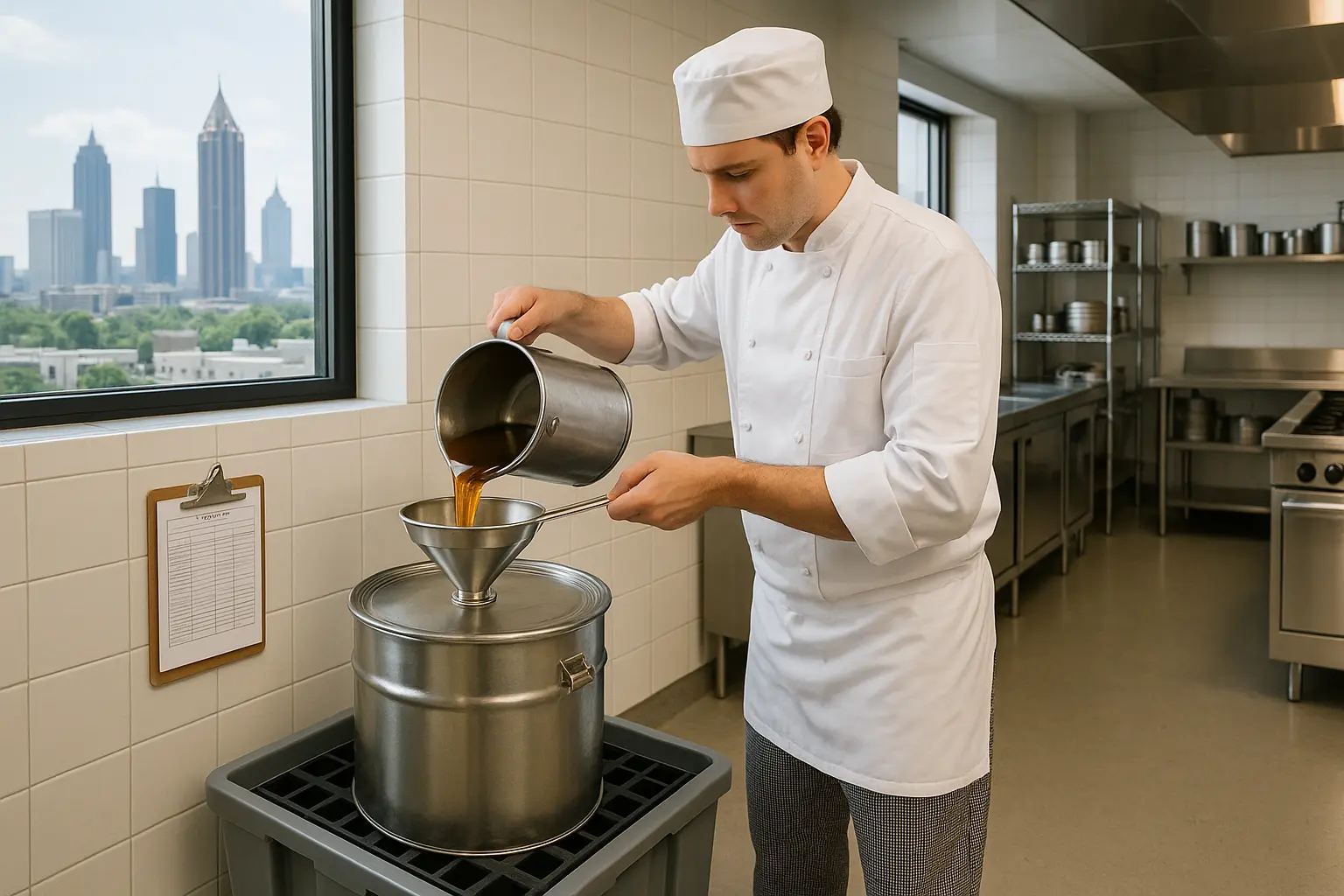Table of Contents
Why Proper Oil Management Matters in Atlanta
Atlanta inspectors treat fryers and drains as public‑health flashpoints. A single spill can clog sewers, violate the City’s Fats, Oils & Grease (FOG) Ordinance, and trigger EPA scrutiny. When you manage oil correctly, you protect waterways, avoid $1,000‑a‑day fines, and keep your kitchen insurance premiums in check. You also unlock a revenue stream: licensed recyclers now pay up to $0.50 per gallon for clean, contaminant‑free yellow grease. With consumer demand for sustainable dining on the rise; think “Zero‑Waste ATL” initiatives; smart oil practices become a marketing asset, not just a maintenance chore. In short, compliance is the cheapest form of reputation insurance.
Federal & Georgia Baseline Rules You Must Know
Start with the EPA’s Spill Prevention, Control, and Countermeasure (SPCC) Rule, which applies if your aggregate oil storage (fresh + waste) exceeds 1,320 gallons above ground. Even below that threshold, the Clean Water Act still prohibits discharging oil‑laden wastewater into storm drains. Georgia’s Environmental Protection Division layers on its Solid Waste Management Act, classifying unpermitted oil dumping as illegal disposal. Together, these laws demand secondary containment, labeled tanks, and documented hauling records kept on‑site for three years. Think of these federal‑state rules as the floor; Atlanta’s city code raises the ceiling.
City of Atlanta & Fulton County FOG Rules: The Local Layer
The Department of Watershed Management enforces Section 154‑279: FOG Control. You must install a properly sized grease trap or interceptor, service it at least every 90 days, and file pump‑out manifests through the city’s Grease Track portal. Fulton County mirrors these requirements for restaurants outside city limits but within the county sewer district. Inspectors will ask for:
(1) your hauler’s permit number, (2) trap‑cleaning logs, and (3) evidence that no fryer oil hits the drain.
Non‑compliance can shut down your kitchen the same day. Because the county shares data with the state, penalties can escalate to state‑level enforcement.
Approved Storage Containers & On‑Site Handling Standards
Oil must cool to 120 °F or below before transfer. Use leak‑proof steel drums, 70‑gallon mobile caddies, or fixed 140‑ to 300‑gallon outdoor tanks with self‑closing lids—plastic bins and open barrels fail inspection. Secondary containment must hold 110 % of the largest vessel’s capacity. Place containers on a non permeable surface, five feet from any storm drain. Label clearly: “USED COOKING OIL—FOOD GRADE.” Train staff to wear thermal gloves and wipe spills immediately with absorbent pads; “hose‑downs” send oil to the sewer and violate FOG rules. A posted SOP near the fry station keeps everyone accountable.
| Requirement | Minimum Standard |
|---|---|
| Container Material | Food‑grade steel or HDPE, sealed lid |
| Secondary Containment | 110 % of largest vessel volume |
Legal Disposal & Hauling: Choosing a Licensed Recycler
Atlanta recognizes haulers permitted by the Georgia Department of Agriculture. Before signing a contract, verify the permit number, proof of insurance, and EPA registration if the recycler produces biodiesel. Best in class haulers provide tamper proof RFID tags on tanks and email you chain‑of‑custody receipts; perfect evidence for inspectors and insurance audits. Many bundle grease‑trap pumping with oil pickup, reducing service windows. Negotiate a revenue‑share price indexed to the rendered‑oil market so you capture upside when commodity prices rise. Schedule pickups based on fill‑sensor alerts, not rigid calendars, to cut overflow risk.
Enforcement, Penalties & Inspection Prep
First offenses typically trigger a corrective‑action notice with a 30‑day fix window. Repeat violations can cost $1,000 per day per infraction plus wastewater‑cleanup fees. Inspectors arrive unannounced; keep the following binder behind the manager’s desk:
(1) SPCC plan (if applicable), (2) the last four grease‑trap service logs, (3) six months of oil‑pickup manifests, and (4) staff training sign‑offs.
A quick walk‑through; no odors, lids closed, area clean; signals professionalism and often shortens the visit to under ten minutes.
Beyond Compliance: Sustainability & Revenue Opportunities
Used oil is no longer “waste”; it’s a low‑carbon feedstock coveted by biodiesel plants in Georgia’s burgeoning circular economy sector. Restaurants touting closed‑loop recycling can feature “Powered by Your Fries” stories on menus and social media. Partner with recyclers who provide ESG data: pounds of CO₂ offset, gallons of diesel displaced. Those numbers resonate with Atlanta diners who frequent BeltLine eateries and expect eco credentials. Some haulers offer branded decals and quarterly impact reports; free marketing collateral that differentiates you from competitors still treating grease as garbage.
Action Checklist & Next Steps
- Audit storage capacity against the 1,320‑gallon SPCC trigger.
- Upgrade containers to sealed, labeled tanks with secondary containment.
- Enroll in the City’s Grease Track portal and upload service manifests.
- Select a licensed recycler with transparent pricing and RFID tracking.
- Train staff on safe handling, spill response, and documentation.
Complete these five steps and you’ll meet every law on the books, turn compliance into cash, and earn goodwill with diners and inspectors alike.









